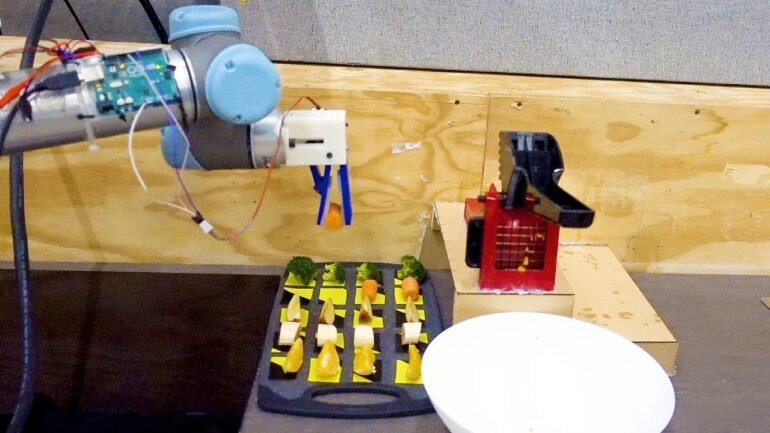TL;DR:
- Cambridge University’s engineering team introduces a groundbreaking robotic chef that learns and replicates recipes by analyzing food preparation videos.
- The robotic chef combines computer vision, machine learning, and robotics to understand and mimic human actions in the culinary world.
- Learning from videos is a challenging task for AI due to the complexity of cooking, involving precise movements, various ingredients, and timing.
- The robot deciphers patterns and sequences from videos, enabling it to recreate actions and transform digital recipes into real dishes.
- The implications of this breakthrough extend beyond the culinary field, potentially revolutionizing industries such as healthcare, construction, and space exploration.
- The ability to learn from videos opens doors to a new era of machine learning, where robots can grow and adapt based on their observations.
- Cambridge University’s research team envisions this robotic chef as a step towards developing versatile and self-learning robots.
- Although there is still progress to be made, this research brings us closer to a future where robots can learn and perform complex tasks by observing human behavior.
Main AI News:
In a remarkable feat of engineering, the distinguished team at Cambridge University has unveiled their latest innovation in robotics: a visionary robotic chef capable of learning and recreating recipes by analyzing food preparation videos. This groundbreaking development seamlessly integrates computer vision, machine learning, and robotics, catapulting AI capabilities to unprecedented heights in comprehending and executing intricate tasks.
The distinctive learning ability of this robotic marvel is founded upon a sophisticated network of algorithms, empowering it to assimilate and imitate human actions within the realm of gastronomy. By immersing itself in a diverse array of recipe videos, the robot gains a profound understanding of the various actions and ingredients involved. From the delicate art of vegetable slicing to the artful infusion of flavors, the robot discerns patterns and sequences, enabling it to faithfully replicate these actions and transform virtual recipes into tangible, delectable dishes.
Unveiling the Complexity
However, the process of learning from videos proves to be an extraordinarily demanding task for AI. Cooking is a multifaceted craft, intricately woven with precise movements, a medley of ingredients, and an acute sense of timing. The robot must unravel these intricate nuances from two-dimensional videos, apply this knowledge to a three-dimensional environment, and execute its duties with mechanical appendages.
Moreover, the videos lack a predetermined structure or sequence for the robot to follow. It must decipher the optimal order of tasks, comprehend the purpose of various culinary tools, and anticipate the harmonious amalgamation of ingredients for a gratifying outcome.
Revolutionizing Industries
The implications of this groundbreaking achievement extend far beyond the culinary realm, holding the potential to redefine the utilization of AI across diverse industries. The impact of such advanced AI extends to healthcare, where it can enhance surgical assistance, to construction, where it can streamline building and assembly tasks, and even to the space industry, where it can spearhead robot-led missions. This paradigm shift has the power to unlock previously untapped potentials in autonomous systems, revolutionizing our interaction with technology in our everyday lives.
Furthermore, the capacity to learn complex tasks through video analysis heralds a new era of machine learning. No longer confined to the limits of their programming, robots now possess the ability to learn and evolve based on their observations. This transformative breakthrough promises a future where robots adapt and grow alongside human progress, bridging the gap between man and machine.
Envisioning a Future of Learning Robots
The visionary research team at Cambridge University perceives this pioneering robotic chef as a significant stride toward an era of learning robots. Their trailblazing work lays the foundation for the creation of more versatile and self-learning machines, capable of performing an expansive array of tasks across diverse environments.
While there is undoubtedly a long road ahead before robots of this caliber become commonplace, this trailblazing research undeniably propels us one step closer to a future where robots can acquire knowledge, adapt, and master complex tasks merely by observing and learning from human behavior. This convergence of technology and human expertise holds boundless possibilities, promising a world where robots seamlessly integrate into our lives as invaluable companions and collaborators.
Conclusion:
The development of a robotic chef capable of replicating recipes by analyzing food preparation videos marks a significant leap in AI capabilities. This breakthrough not only revolutionizes the culinary industry but also has far-reaching implications for other sectors such as healthcare, construction, and space exploration. The ability for robots to learn from videos opens up new possibilities for machine learning, enabling robots to evolve and adapt based on their observations.
As this technology progresses, it is expected to reshape the market by introducing more versatile and self-learning robots capable of performing a wide range of complex tasks in various environments. Businesses in industries affected by automation and robotics should closely monitor these advancements and explore opportunities for integrating this technology into their operations to stay competitive in the evolving market landscape.

